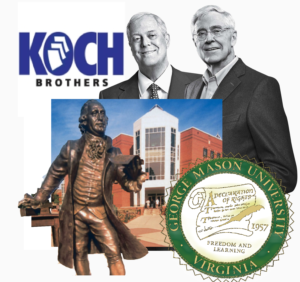The release of donor agreements between George Mason University and the foundation follows years of denials by university administrators that Koch foundation donations inhibit academic freedom.
University President Angel Cabrera wrote a note to faculty Friday night saying the agreements “fall short of the standards of academic independence I expect any gift to meet.” The admission came three days after a judge scrutinized the university’s earlier refusal to release any documents.
The newly released agreements spell out million-dollar deals in which the Koch Foundation endows a fund to pay the salary of one or more professors at the university’s Mercatus Center, a free-market think tank. The agreements require creation of five-member selection committees to choose the professors and grant the donors the right to name two of the committee members.
The Koch Foundation enjoyed similar appointment rights to advisory boards that had the right under the agreements to recommend firing a professor who failed to live up to standards.
The effort at George Mason is not isolated. It is part of a coordinated effort to reshape the American university under a Koch sponsored Association for Private Enterprise Education (APEE). According to The Atlantic, four years ago, Kevin Gentry , a staffer for the Koch’s network laid out the billionaire brothers’ strategy to spread their views on economic freedom. He said that the strategy begins with reaching young minds in college lecture halls, thereby preparing bright, libertarian-leaning students to one day occupy the halls of political power. “The [Koch] network is fully integrated, so it’s not just work at the universities with the students, but it’s also building state-based capabilities and election capabilities and integrating this talent pipeline,” he said. (quote from recording obtained by the Center for Public Integrity .
The APEE describes itself as “an association of teachers and scholars from colleges and universities, public policy institutes, and industry with a common interest in studying and supporting the system of private enterprise.” Our recent recordings of the APEE 2016 conference included several professors speaking far-too candidly, about how to “take over” curriculum, majors, and hiring, and about using the classroom as “primarily as recruitment grounds” for Koch’s liberty movement.
Speaking to room full of professors, the Koch foundation’s Charlie Ruger was clear, “we want these great ideas of the APEE network to be applied, the way we think about it at least, across sort of an integrated structure of production for culture change,” to include “arranging state legislative testimony to make sure that, you know, these kinds of ideas have a seat on the table in public policy.”
SEE THE 2016 CONFERENCE PROGRAM AND A LIST OF PARTICIPANTS BY UNIVERSITY.
FIND OUR RECORDINGS AND TRANSCRIPTS HERE.
Cabrera emphasized in his note to faculty that the “agreements did not give donors control over academic decisions” — an apparent reference to the fact that the Koch Foundation did not control a majority of seats on the selection committees.n said Cabrera was unavailable for an interview. On Monday night, Cabrera issued a statement saying he is ordering a review of all the university’s donor agreements that support faculty positions to “ensure that they do not grant donors undue influence in academic matters.”

The documents were released to a former student, Samantha Parsons, under a Freedom of Information Act request she filed earlier this year after years of having similar requests rejected. Parsons said the documents are strikingly similar to agreements the Koch Foundation made with Florida State University that caused a similar uproar.
The Koch Foundation issued a statement saying the agreements with Mason are “old and inactive” and that newer agreements contain no such provisions.
“We took criticism of our agreements seriously when similar concerns were raised” about the Florida State deal in 2008, the foundation’s director of university relations, John Hardin, said in the statement.
Mason, which has developed a reputation over the years as a conservative powerhouse in law and economics, has received increased scrutiny about its connections to the Koch Foundation since 2016, when Mason renamed its law school for conservative jurist Antonin Scalia. A 2016 analysis by the AP found that Mason received more money from the foundation than any school in the country.
“Private donors have been provided influence over faculty affairs at our public university,” she said. “This is a violation of the public trust.”
Del. Marcus Simon, a Fairfax County Democrat who helped lead a petition effort in 2016 to block the name change, said he is not surprised to see the level of influence granted to the donors in these agreements.
“The idea that the Kochs are giving money without anything expected in return always seemed a little absurd,” he said.
He said the university should release all of its agreements with the Koch Foundation, including its most recent ones.
